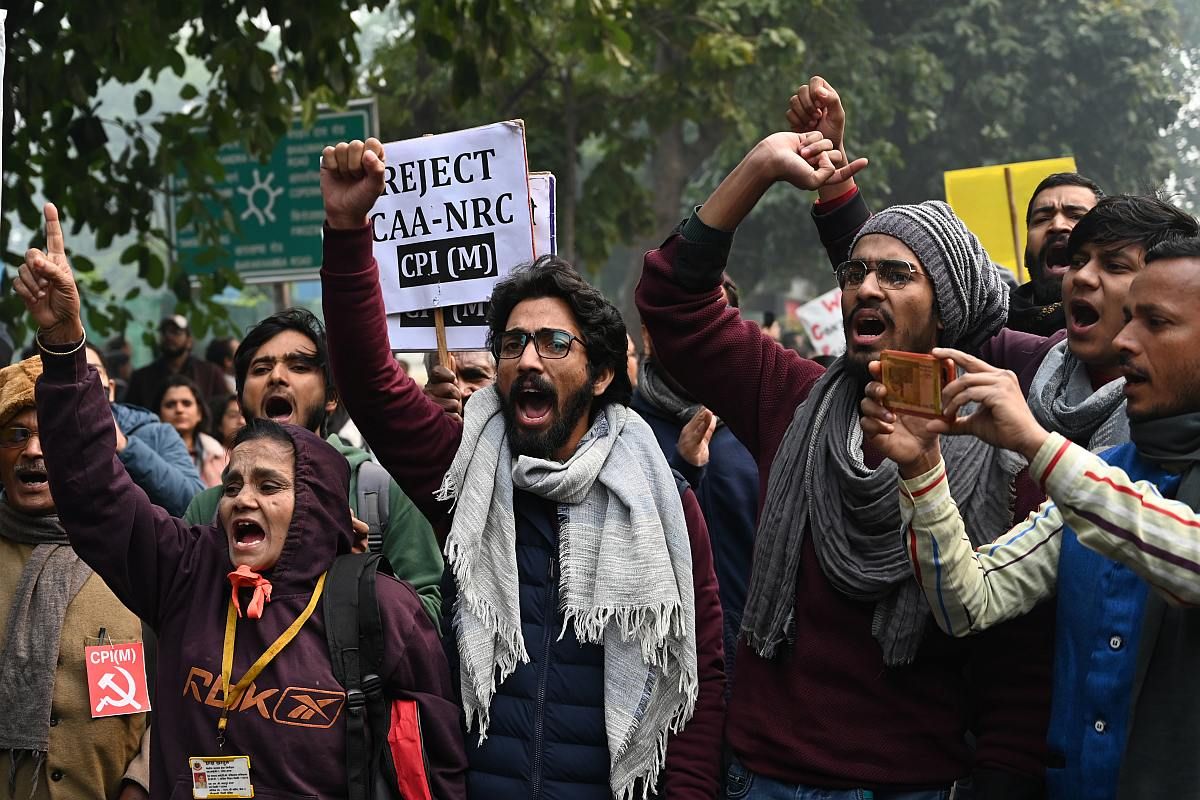MP CM grants citizenship to 3 persons under CAA
The three youths who received the citizenship certificates at Bhopal from the CM are Rakhi Das and siblings Sanjana Melwani and Sameer Melwani.
Besides showing their religious evidence, the applicants belonging to Hindu, Sikh, Christian, Buddhist, Jain or Parsi faiths will also have to furnish documents to prove that they entered India on or before December 31, 2014.

People shout slogans during a demonstration against CAA, NRC, NPR in New Delhi on December 19, 2019. (Photo: AFP)
Non-Muslim refugees from Pakistan, Bangladesh and Afghanistan will have to provide proofs of their religious beliefs while applying for Indian citizenship under the controversial Citizenship Amendment Act (CAA), officials said on Monday.
A government official told news agency PTI that those seeking Indian citizenship will have to provide proofs of their religious beliefs and this will be mentioned in the rules to be issued under the CAA.
Besides showing their religious evidence, the applicants belonging to Hindu, Sikh, Christian, Buddhist, Jain or Parsi faiths will also have to furnish documents to prove that they entered India on or before December 31, 2014.
Advertisement
The CAA was passed by parliament on December 11. According to the CAA, members of Hindu, Sikh, Buddhist, Jain, Parsi and Christian communities who have come from Pakistan, Bangladesh and Afghanistan till December 31, 2014, facing religious persecution there will not be treated as illegal immigrants but given Indian citizenship.
But in regards to Assam, the central government is also likely to make an exception with a smaller window of just three months to those who want to apply for Indian citizenship.
Some Assam-specific provisions are expected to be incorporated in the rules to be issued for the implementation of the CAA.
Assam Chief Minister Sarbananda Sonowal and his Finance Minister Himanta Biswa Sarma had made a request to keep a limited period window for applying under the CAA and also incorporate some other Assam-specific provisions in the CAA rules.
The move comes in view of continuing protests against the CAA in Assam that have been going on since the legislation was passed by Parliament in December last year.
Assam has witnessed violent protests against the Citizenship Amendment Act and the National Register of Citizens with three rail stations, a post office, a bank, a bus terminus, shops, dozens of vehicles and many other public properties being set ablaze or damaged by the protesters. Five persons have lost their lives in the stir since December 11.
Protesters here have expressed concerns that refugees allowed by the Act could endanger the identity and livelihood of the indigenous people.
The Assam Accord provides for detection and deportation of all illegal immigrants who have entered the country after 1971 and are living in the state, irrespective of their religion.
The protesters in Assam say that the CAA violates the provisions of the Assam Accord.
Protests have continued to erupt across the country against the contentious law stating that it is “anti-minority” and therefore “unconstitutional”.
Those who are opposed to the legislation have said that it is for the first time that India will grant citizenship on the basis of religion which violates the basic tenets of the country’s constitution.
However, the government and ruling BJP has been defending the act saying that the minority groups from the three countries have no other option but to come to India when they face religious persecution there.
Meanwhile, the Centre has announced that the Citizenship Amendment Act (CAA) has come into effect from January 10, 2020.
(With PTI inputs)
Advertisement